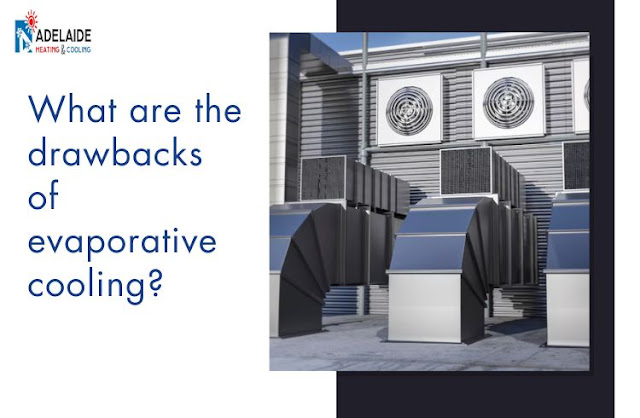What are the drawbacks of evaporative cooling?
Evaporative cooling has long been a popular method for beating the heat, especially in dry climates. Known for its energy efficiency and eco-friendliness, this cooling method has been adopted by many households and businesses across Adelaide. Adelaide Heating and Cooling, a leading provider in the region for evaporative air conditioning Adelaide, ducted air conditioning Adelaide, and general air conditioning Adelaide, delves into the less-discussed aspects of evaporative cooling systems. While they offer several benefits, it's crucial to understand their drawbacks to make an informed decision about your cooling needs.
Understanding the Drawbacks of Evaporative Cooling
Limited Effectiveness in Humid Conditions
One of the primary limitations of evaporative cooling systems is their reduced efficiency in humid environments. Unlike traditional air conditioners that can cool air regardless of the humidity level, evaporative coolers rely on the evaporation of water to reduce temperature. In areas where the air is already saturated with moisture, such as during Adelaide's humid spells, the evaporative cooler's ability to cool the air diminishes significantly.
Frequent Maintenance Requirements
Evaporative coolers require regular maintenance to operate effectively. The pads that facilitate evaporation need to be cleaned and replaced frequently to prevent mold and mineral build-up. Failure to maintain these components can lead to reduced air quality and a decrease in system efficiency. Adelaide Heating and Cooling emphasizes the importance of regular checks and maintenance for evaporative air conditioning Adelaide systems to ensure they perform at their best.
Water Usage
While evaporative coolers are lauded for their low energy consumption, it's essential to consider their water usage. In areas where water conservation is a priority, the continuous need to replenish the water in these systems can be a significant drawback. This aspect is particularly relevant for Adelaide, where water resources can be scarce, especially during dry seasons.
Indoor Humidity Increase
Another drawback associated with evaporative cooling is the potential increase in indoor humidity levels. As the system operates by adding moisture to the air, it can make indoor environments feel muggier, particularly if the system is oversized or used excessively. For homes in Adelaide that already struggle with high humidity, this can lead to discomfort and other issues such as mold growth.
Limited Cooling Capacity
Compared to ducted air conditioning Adelaide systems, evaporative coolers offer a limited cooling capacity. They are generally more suited for moderate cooling needs and may struggle to provide comfort during extreme heatwaves. For Adelaide residents looking for a cooling solution that can offer consistent and powerful cooling regardless of external temperatures, a ducted air conditioning system might be a more suitable option.
Outdoor Air Dependency
Evaporative cooling systems rely on a continuous flow of outdoor air to operate efficiently. This requirement means that windows or doors must be left open to allow air to circulate. While this can be beneficial for indoor air quality, it also means that pollutants, allergens, and insects can enter the home more easily. Additionally, for security-conscious homeowners in Adelaide, leaving windows or doors open may not always be desirable.
Noise Levels
While advances have been made in reducing the operational noise of evaporative coolers, they can still be louder than their ducted air conditioning counterparts. The fan and water pump can generate noise that may be disruptive, particularly if the unit is close to living spaces or bedrooms. Adelaide Heating and Cooling recommends considering the placement of your evaporative air conditioning Adelaide system to minimize noise impact.
Aesthetic Impact
Evaporative coolers typically require the installation of large vents on the roof or walls of a home, which can impact the aesthetic appeal of your property. Unlike ducted air conditioning Adelaide systems, which can be almost invisible, evaporative coolers may not align with every homeowner's design preferences.
Conclusion
Evaporative cooling offers a cost-effective and environmentally friendly way to stay cool, but it's not without its drawbacks. The effectiveness, maintenance requirements, water usage, and potential increase in indoor humidity are factors that Adelaide residents should consider. For those seeking a more versatile and powerful cooling solution, Adelaide Heating and Cooling suggests exploring ducted air conditioning Adelaide options. Understanding the limitations of evaporative cooling can help you make an informed decision that best suits your comfort needs and lifestyle.




Comments
Post a Comment